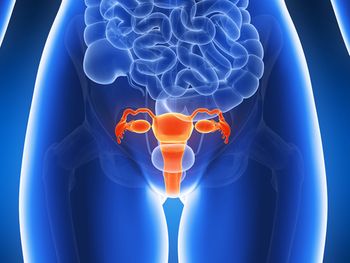
For patients with PCOS, a common household ingredient may help improve symptoms of the disorder. However, lifestyle modifications that support weight loss and healthful eating remain key to improving symptoms.

For patients with PCOS, a common household ingredient may help improve symptoms of the disorder. However, lifestyle modifications that support weight loss and healthful eating remain key to improving symptoms.

New research, led by Connie Trimble, MD, shows that vaccine treatments for women with high-grade cervical dysplasia can trigger an immune response that may induce some lesions to resolve.

The sexual behaviors and beliefs about HPV infection were unchanged among a group of teens and young women who were vaccinated against the virus, research shows.

DNA analysis of vaginal swabs shows that cervicovaginal microbiota differs in the late second and early third trimester in women destined to have a preterm birth.

The risk of death in the first 28 days of life was roughly 4 times higher for babies delivered at home by midwives than babies delivered at a hospital by midwives, new research shows.

It seems that cost and lack of information are at the heart of why more adolescents aren’t vaccinated against human papillomavirus (HPV), according to a recent review of the literature.

Google Glass Explorers Brian Levine, MD, MS, and John Nosta, a health and technology expert and Forbes contributor, discuss their opinions on Google Glass and how they think it is and will affect the healthcare industry.

Electronic medical records have a purpose, but they also may encourage physicians to behave unethically. More to the point: would your patient recognize her exam as described in an EMR?





High body mass index (BMI) and short stature are risk factors for cesarean delivery across all racial/ethnic groups, according to a study to be presented at the 34th Annual Meeting of the Society for Maternal-Fetal Medicine: The Pregnancy Meeting on February 7, 2014 in New Orleans.



Gestational surrogacy in India is on the rise. How will this help or harm American couples and Indian surrogates?

What are the rights of a pregnant woman whose actions or condition may harm her unborn child?

Is funding of medical education, research, and clinical care sustainable?

Opinions differ on the value of sending placentas for pathology examinations. The author calls for standardizing when, why, and how this occurs.


Drug abuse during pregnancy has become more common in recent years. Here's how to intervene in a way that will most benefit both mother and baby.

(PDF) SMFM Patient Handout: Risks of Chorionic Villus Sampling (CVS) and Amniocentesis

A reader writes regarding the November 2013 article "The transcervical Foley balloon." Are there any data that this method of induction is connected to higher rates of umbilical cord prolapse?

Questions and answers about fetal loss and complications associated with chorionic villus sampling and amniocentesis.

Brian A. Levine, MD, MS shares his insight and opinions about his personal and professional use of Google Glass.Dr. Levine is a clinical fellow at the Ronald O. Perleman & Claudia Cohen Center for Reproductive Medicine at the Weill Cornell Medical College at New York Presbyterian Hospital.

New evidence reveals that there may be a benefit to continuing cervical cancer screening beyond age 65 years.

Taking hormone replacement therapy (HRT) for at least 6 months after total knee arthroplasty (TKA) or total hip arthroplasty (THA) may reduce risk of repeat surgery. So say the results of a community-based cohort study of women in the UK who had undergone TKA or THA for osteoarthritis.

Hispanic women are twice as likely as their Caucasian counterparts to suffer from vulvodynia, according to results of a longitudinal population-based study in Obstetrics and Gynecology.

Fetal growth during the first trimester can set the stage for cardiovascular health later in life, according to a recent study.